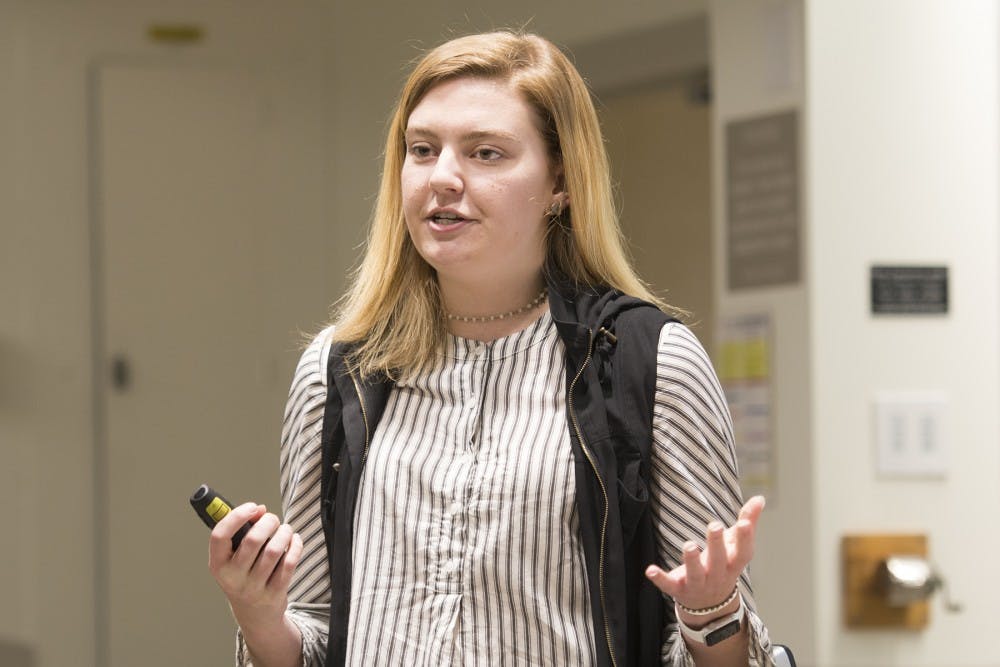The University Democrats hosted Nicholas Parker and Nicholas Rogers from the Albemarle County Democratic Party Wednesday evening for a "crash course" on the upcoming Charlottesville and Albemarle County caucuses.
Albemarle County and the City of Charlottesville’s Democratic caucuses will be held April 16 and April 21, respectively. The caucuses will select delegates who will be sent to the Fifth District convention May 5 to choose a candidate for the 2018 midterm election.
The Albemarle County caucus will be held in Monticello High School April 16 at 5:30 p.m. Voters have to be in line and register to receive and sign their Caucus Declaration Form by 6:30 p.m. in order to participate — the Declaration Form certifies the caucus-goers’ intent to not support opposing candidates to the Democratic nominee in the next election. The Charlottesville caucus will be held April 21 at Burley Middle School from 2:15 p.m. to 4:15 p.m.
Parker said voters should plan to show up early for the caucuses as he anticipates attendance at the caucuses to be higher than previous years.
The nominee will be selected at the convention from the current Democratic Candidates — Leslie Cockburn, Ben Cullop, Roger Dean Huffstetler and Andrew Sneathern. The selected nominee will run against incumbent Rep. Tom Garrett (R) in the November midterm elections.
The Democratic convention will be held in Farmville, Va. During the convention, 250 elected caucus delegates from the 23 localities of the Fifth District will vote to select a Democratic congressional nominee.
Jackson Samples, a second-year College student and University Democrats campaign chair, said the group decided to host the event because the caucus convention procedure is quite complicated and a lack of knowledge on the process could lead to less student participation.
“If there’s too much going on, you have to spend too much time looking into the process, then students just won’t turn out,” Samples said. “Hopefully, having a speaker talking about it can make it a little more clear and a little more personal than just emails going out to people.”
Parker and Rogers currently work with the county’s Democratic Party where Parker serves as the social media outreach manager and Rogers serves as vice chair of communications.
They shared logistical details for the two separate caucuses. Rogers stressed the difference between the Albemarle County and Charlottesville caucuses at the beginning of the presentation. Although the county seat is in Charlottesville, the jurisdictions are separate political and legal entities.
“If you have any questions about where you are registered, you can Google ‘Virginia voter registration’ and they will have the information on what jurisdiction you are registered in,” Rogers said. “In terms of registration, you must be registered to vote before the caucus. You must be registered to vote — if you are not registered to vote by [the coming] Monday, you will be turned away.”
Rogers added that the Fifth District Democrats decided to hold a caucus as opposed to a primary election because he said caucuses prompt candidate engagement with local activists and Charlottesville and Albemarle County community members.
According to Rogers and Parker, after standard procedures take place, caucus-goers should gather in the section of the room marked for the candidate they prefer.
“In our [Albemarle County] caucus and the city caucus, there will be six different places for you to go,” Rogers said.
In addition to expressing support for the four candidates, participants can express a preference for two other categories — “uncommitted” and “no candidate.”
“The ‘uncommitted’ category means that you are voting for delegates who will go to the May 5th convention uncommitted to any candidate — they can vote for whomever they want at the convention,” Rogers said. “The ‘no candidate’ groups means that you believe the Democratic Party has lost its ways, and you think that we should not run a candidate because the Republican will be the best choice in November.”
Rogers said that if a candidate does not receive 15 percent of the total vote of caucus-goers, the candidate is declared unviable — they are no longer an option for the caucus. Voters then have the choice to leave the caucus or go to a different, viable candidate.
Samples said University Democrats is looking to set up car rides, especially for first year students, with CAR2Vote — a local service — to transport students to the caucus locations. They are organizing rides from O-Hill on Albemarle County’s caucus day and rides from Ruppel Drive — located behind the Commerce School — to the Charlottesville caucus.
Third year College student Ali Barakat attended the event and said Parker and Rogers’ presentation was informative and helped him feel more confident in his decision to attend the caucus.
“I’m more interested now — I want to do more,” Barakat said. “Given the way the political system is now, I feel like there isn’t enough participation, so if there’s anything I can do, or if I could get my friends to show up, that’d be nice.”
Samples said student participation is important because they have the right to help select the Democratic nominee, especially because “students tend to vote Democratic.”
“If we can turn up in large numbers to caucus, we can make sure candidates are focused on issues of higher education and the rising cost of higher education and the other issues that students deem important to them,” Samples said.





